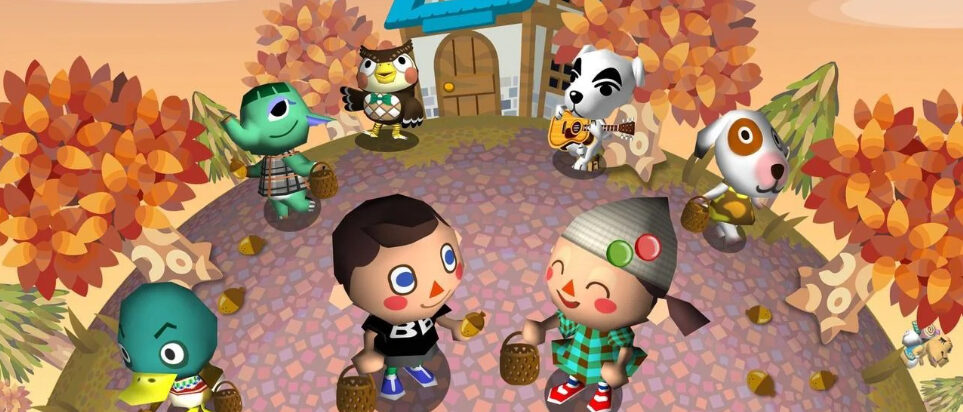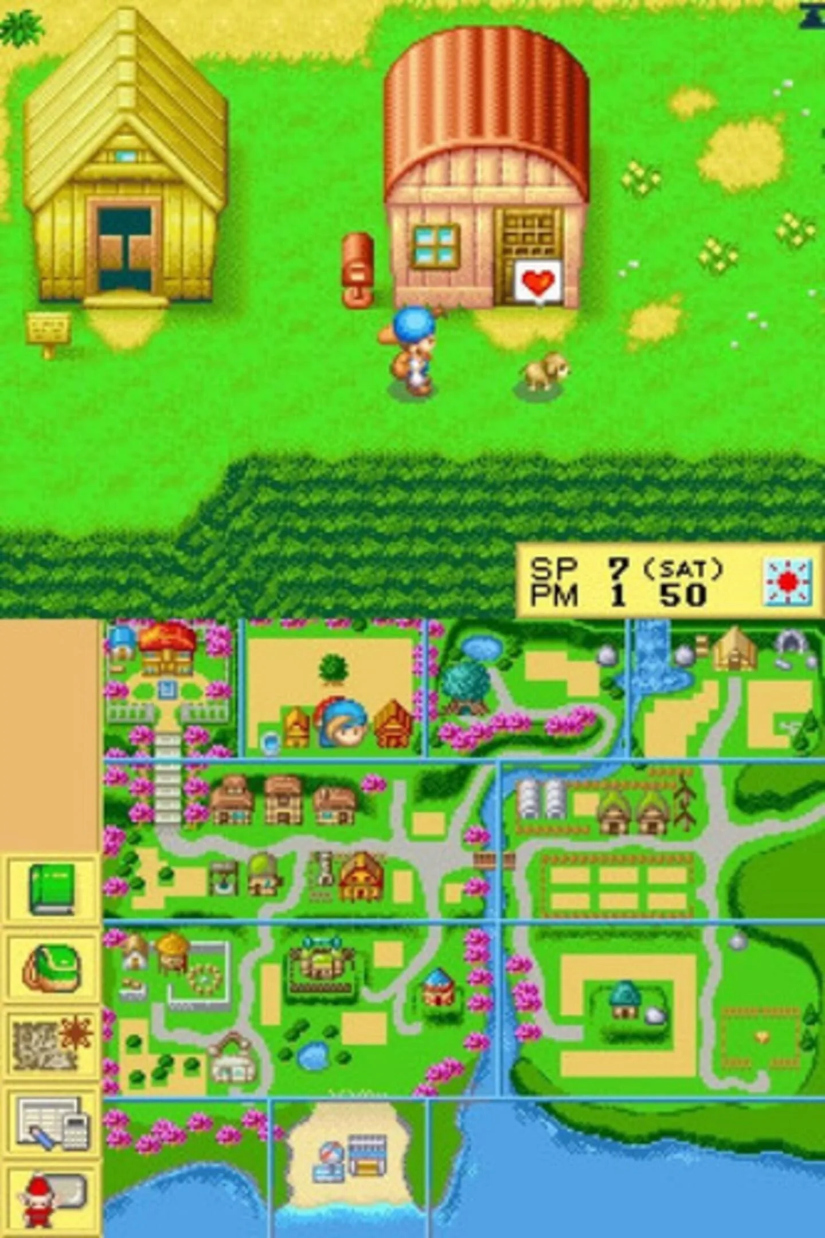
Virtual Citizen

This column is a reprint from Unwinnable Monthly #163. If you like what you see, grab the magazine for less than ten dollars, or subscribe and get all future magazines for half price.
———
What’s left when we’ve moved on.
———
I received Animal Crossing: Wild World for Christmas in 2005. Prior to this watershed personal moment, I was scared of videogames. I sometimes watched my dad play Age of Empires on the computer or played Zoo Tycoon on CD-ROM, but anything else confused me. Even the most laid-back series in history couldn’t break this trend. When it came time to input the name of my town, I deliberated for half an hour, thinking mistakenly that whatever I typed in would affect where the game would take me: beach, mountains, New York, etc. Eventually I settled on “home,” the least threatening thing I could think of.

We all have games that teach us how a certain kind of game works. For me this was Super Mario Galaxy for platformers, Phoenix Wright for VNs, (weirdly) Kingdoms of Amalur: Reckoning for RPGs; they were like road maps for teaching me what I appreciate about these genres. But Animal Crossing: Wild World taught me how I felt about videogames. It was my template for what it meant to move, speak and act in a virtual world. I’d guess it either explains my attraction to life sim and decorating games (and the modded playthrough of Stardew Valley I started this year, after way too much time spent on it already) or was just the first place I could express it.
When I considered revisiting Wild World for the column, I had to contend with finding it. I lost it (in the cushions of a car, probably) sometime in my early teens after we moved houses, meaning that the game’s presence in my life tracks with my childhood, its absence with my growing up. Not only is it difficult to get ahold of the cartridge now, I also felt weird about trying to play it again. Revisiting that time while knowing what the series would develop into – something very smooth, almost app-like, with dailies and quality-of-life features – might ruin something I didn’t know I had.
And when I went to look at cartridges on eBay, something else made me pause. The reviews all mentioned the towns that existed on the used copies they bought, towns they were hesitant to delete. “No issues except the sadness of someone else’s leftover village and memories,” someone said.
A legend, per the OED, is “a story from ancient times about people and events that may or may not be true.” If the residents of Wild World are anything in my memory, they are that: ancient stories. I remember going to see KK Slider on Saturday (?) nights in the cafe. I remember trying and failing to fill out the bug exhibit. Though I’ve never played any Animal Crossing in the systematic daily way you’re supposed to, I did find my own rhythm, though never with time travel, because this was the one where the game bullied you if you quit without saving.

Can you go back to a legend, or to childhood? The consensus seems to be no. As I clicked the purchase button, I wondered if the cartridge would be corrupted, or some other game entirely, so that I would be shut out from the experience even more definitely than I already was. I decided that I’d let the game make the decision for me: if the game worked, I’d play it, and if there was another island on the cartridge, I’d play it too.
As it turned out, GameStop shipping issues were what made the decision for me. The cartridge is still in limbo somewhere, and I let that be the message I needed – I wasn’t going to mess around with someone else’s dream. So, I did the next best thing: I dug out my 3ds and my copy of the next game in the series, Animal Crossing: New Leaf.
From the start my playthrough was feverish. My first day back it was Shamrock Day, the Animal Crossing universe’s St. Patrick’s Day. It was actually March 27, though, because New Leaf thought it was 3 hours and 10 days behind whatever date my system clock was set to, so at 6:30 am I was greeted by Isabelle next to a standee of a leprechaun and a rainbow. She gave me oolong tea, a random gesture that I misinterpreted, at first, as a joke.
Even without the disorienting holiday, it felt like I was looking at something I shouldn’t be. Part of this was because nothing looked familiar, since I’d spent much less time in the town than I had in my Wild World home or my much later New Horizons playthrough. I’d done almost nothing in my town while I was there. Judging by my previously caught insects, I only played it for a few weeks in the summer. A passing comment from a villager said I’d been gone “over 5 years” (Merengue, my favorite, more tactfully said I’d been gone “a long time”).
My house was more of a shock to me. In the first game I always focused on paying down my debt so I could get some more in the form of a house renovation, because decorating my house was my favorite thing to spend time on. Here, I’d done nothing. I couldn’t even figure out how to pay my loan. Somehow, I’d ended up with a Seurat painting on my wall. Where my Wild World town was constructed out of months of repetitive child’s play, my New Leaf town was forever stuck in the very first house renovation and public works project. But in an homage to my first town, I’d named my second one Home – capital H this time.

Going back to New Leaf wasn’t unpleasant, by any means, but it reminded me that a large part of thinking about something you liked in childhood is engaging with the full range of emotions it made you feel then, some of which you probably forgot about. One of these is remembering the ways it confused or upset you. The mirror version of Animal Crossing to me was Harvest Moon DS, a game my older cousin suggested. There’s no way he knew how good a match it would be for my personality: it asks you to collect 101 Harvest Sprites by doing various tasks and building up your farm. This game has a mythological status in my brain. I played it so many times, yet never got to the 101 sprites, or even got to marriage, one of the standard goals in a Harvest Moon game. I spent all my time collecting different colored grasses (the series’ abstract representation of food, I guess), taking care of my animals and accidentally falling down holes in the mines. I didn’t understand some of the systems, which in fairness to me were not covered in the petite insert I remember flipping through in the back of my parents’ car. The rules were obtuse, as were the requirements for events: it was 2006, or maybe I played it a bit later, and I had no PC or phone to look up hints for a videogame.
So large parts of it remained a black box: I remember a plot line with a mermaid trapped in a mad scientist’s house who I visited all the time. There was an island on the bottom of the map, represented as a brown circle, and a boat near the island. Maybe someone in the game suggested you could go there. I never figured out how; the boat remained inert, the mermaid trapped, frozen forever.
These promises are something that defines lots of peoples’ early game experiences. I remember not understanding the concept of boundary lines; you might as well have gone off in any direction and the game would continue, like the world would in real life. Wild World fed this dream for me. The town I made seemed like it was only contained by the sea, and maybe I could learn to swim; and only contained by the railroad that eventually, I learned, I could take to other towns, something I never did (since I never knew anyone else who owned the game). Its influx and outflux of residents, and the knowledge that if I wanted to, I could go elsewhere, made it seem like a real place. You see that mountain, you can imagine how it would be to go there.

I intended to stick with New Leaf for a few weeks, maybe longer, but old habits die hard – I ended up playing it for a week before other morning rituals got in the way. My house is probably covered in bugs again already. But while I was writing this column, I decided to finally 100% Breath of the Wild, everyone’s very favorite game and the epitome of that feeling of possibility. When I went back, one of the first things I did was finish building Tarrey Town, a prefab village you have to gather the materials for. The quest ends in a wedding and the establishment of the town, a community representing every group in Hyrule that also serves as a summary of what you’ve done in the game to bring the world together. But when I stood in my virtual house and listened to rain outside, I thought about how the rain sounds in Wild World. I left the game on for a while and just listened, resting in the space I created just for me.
———
Emily Price is a freelance writer and PhD candidate in literature based in Brooklyn, NY.




